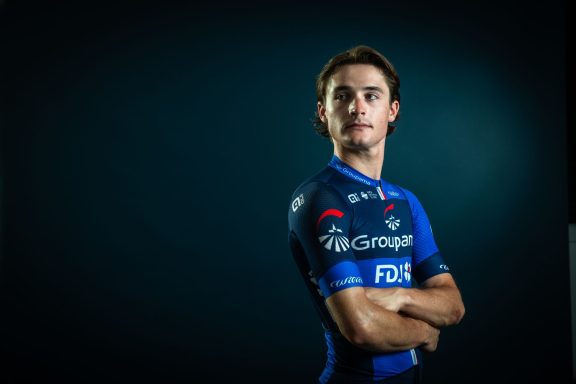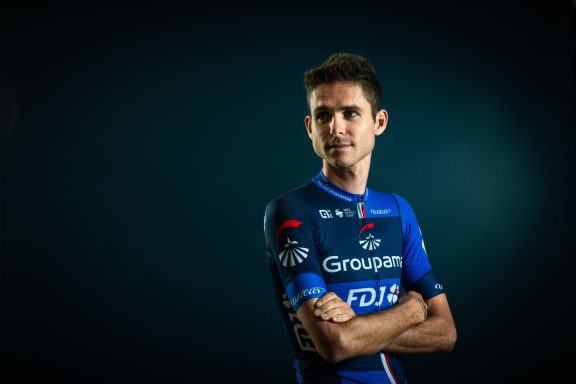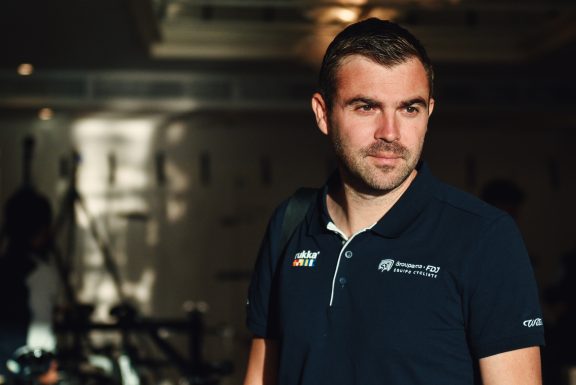Julien Pinot has now been working with the Groupama-FDJ organisation for almost ten seasons. A PhD student at his arrival, in line with the work started by Frédéric Grappe, he has obviously stepped up within the team and gathered a load of knowledge and experience since then. He shares them in this interview in which he also speaks about the different angles of his profession as well as his evolution, correlated to that of the team.
Julien, just a month before the first races, is the team back to a process it entirely masters?
Absolutely. It was important to start progressively and to channel everyone in May. In June however, we got back to some individual training camps, sometimes in altitude, and we had to get the big workloads weeks rolling. We have entered a real season preparation, as we usually experience. It’s like January, but stronger, since we know that the season will be very intense and that all riders must be competitive in August. In January, we are usually able to plan distant goals with some. Right now, all 28 riders are 100% involved in their preparation, training and recovery, whether they are in training camp or at home.
“The model that we have chosen gets everyone’s endorsement”
Some teams have already gathered. Has the team a different road map?
For some teams, training camps are extremely important. For us, considering the way we work with our riders, we believe that it is not necessary to often be in training camp in order to be successful. For that reason, we decided that the collective camps would come in the final phase of preparation, in July, to enable them to get competitive for the races. It will also be important for the riders to meet their teammates again and to feel they are part of a team. It didn’t seem necessary to us to gather them right now, especially since there will be some trips from August to October and the mental freshness could then prove useful. Also, June was all about doing a big fundamental work, which, according to us, can be done individually. It’s a bit like the traditional December training camp, which is not necessarily the most important one in terms of workloads. Some teams choose to gather in June to have everyone on hand. As far as we are concerned, since all riders are trained by the team coaches, we have not felt this immediate need. Everyone has their own way of doing things, but the model that we have chosen for this special preparation gets everyone’s endorsement.
As a coordinator of some partnerships, can you tell us if there has been any progress in terms of equipment development in the past months?
We continuously work with our partners and the lockdown did not stop that. Actually, the most complicated thing is that some manufacturing plants have suspended their activity for a few weeks and this has delayed deliveries, especially for the new AirCode and the new Time Trial bike. They were launched in Paris-Nice but the productions have since fallen considerably behind. We recently received the AirCodes and they will all be assembled before the various camps. On the other hand, the TT bike has lagged a bit and we haven’t received it yet. However, this did not prevent us from continuing our research work on various, still confidential, themes of optimizing the bike. We did a lot of videoconferences with our partners. We also did a lot of peripheral testing since we can now go quite far with analysis and development thanks to our Performance Centre in Besançon. We did not waste our time.
“My goal is that the rider fulfils himself in his work”
You are a trainer above all, but have you always been interested in the equipment development?
Before joining the team, I was a coach at CC Étupes and was not really specialized in the equipment area. However, I did my studies in Sports Science and when I joined the team in late 2011, an opportunity arose. The idea was precisely to reconcile training and monitoring of physical potential – characteristics specific to the profession of coach -, but also developing working relationships between the team and its technical partners. Previously, the latters would provide equipment, the team would use it, so promote it, and that was it. As part of my thesis, from 2012 to 2014, we set up collaborations to optimize research and development with every brand. Since then, we have jointly managed to improve. So much so that today, some riders join our team because they know that we are not only very picky in terms of equipment but also that we master almost all stages of development. Through my thesis work, whether in wind tunnel, in digital simulation or with other universities, I became more interested in the equipment side of things, and once my thesis was finished, I went on with this work. For the past two years, with Anthony Bouillod, we are in charge of overall coordination with certain brands. I take care of Shimano, Lapierre and Elite, and he works with Prologo, Garmin and Continental. We handle almost everything, from the order to the development, to monitoring production. We have a fairly similar profile with Anthony as we are focused on performance. Physical one, as a coach, but also through the optimization of equipment.
What is your personal connection to the equipment? Do you test it yourself?
My work is more about analysing and dealing with the partner. For some time now, when we have a project, we develop it with one, two or three riders. Mainly the leaders. Because at the end of the day, the equipment is primarily made for them. If we develop a TT bike, the feedbacks from Stefan and Thibaut will be important, and they would go much further than if another tester or myself would give their opinion. When we developed the AirCode, we called on Arnaud for the Sprint model, and when we develop a more climber-puncher type of bike, we are obviously more attentive and receptive to Thibaut’s feedback. We trust and rest on our riders.
As a coach, which riders do you train and how do you adjust to each of them?
I obviously take care of Thibaut, but also Stefan Küng, Arnaud Démare, Anthony Roux, Rudy Molard, whom I already trained at CC Etupes, Sébastien Reichenbach, Tobias Ludvigsson and Kevin Geniets. Each coach has his own vision and sensitivity. I personally see myself above all as someone who guides each rider, trying to give him everything he needs so that he tends towards the maximal utilisation of his potential. I see myself more as a guide than as a dictator/trainer. I think I have created close and healthy relationships with my riders. I am at their disposal and try to provide them with as much information as possible so that they are always able to absorb and understand what they are doing. But ultimately the best trainer for a given rider is the rider himself. In the end, he knows himself better than anyone. It is also why I don’t see the trainer just as someone who sends plans and analyses files. Human relationships must be at the heart of our support. It’s the model that I’m trying to put in place. This year, I’m coaching eight riders but I’ve got eight different ways to coach. We adapt to personality, experience; some have great autonomy, others need to be guided, some want to be challenged while others need to be reassured. The diversity of profiles is also something I like. Analysing the data of their rides is obviously part of our work, but we also try to connect that with their feelings, their sensations, and ultimately their mood and their state of mind, because that necessarily has an impact on what they are able to do in training. I find this mixture fascinating and it creates real human adventures that can be spread over several years. My goal is obviously that the rider wins, but before that, it is that he fulfils himself in his work. It is usually when he does that he manages to perform at his best.
“What stands out is the way the others look at us”
Do you have the feeling that some riders could now almost be autonomous?
I think so, even if it depends a lot on each character. With some riders, we have actually entered this pattern, although we are always trying to bring in touches of innovation in order not to enter into a routine and monotony that would be harmful. With some that I have been training for a very long time, where progression is constant and continuous, we share a great relationship of trust where I rather act as a regulator. This is kind of what happens with Thibaut, who now knows himself perfectly, but we still try to inject new things, such as altitude training. With others, we set a framework together, we plan the objective periods, the recovery phases, but this work is very different from the one I have for example with Kevin Geniets, who is still new within the pros.
Having three team leaders under your responsibility, is this a proof of your evolution within the organisation?
My goal is always to think about the team. I’m coaching a lot of leaders, but it’s also a lot of pressure. We know that when a rider is in poor shape, the coach is quickly pointed out. On the other hand, it is obviously a real satisfaction when preparations we establish work out and lead to results. On the Tour last year, when we would remember the months of preparation, everything that had been done, the moments of life shared during training camps and then notice that the team is operational and united, we can indeed be proud of the work done. It must be said that the sports directors, but also financial and administrative director David Le Bourdiec, trust me more and more thanks to the experience that I have acquired for years and what I showed I was able to do. Fred [Grappe] has also given me more and more responsibilities. He created my position when I arrived and over the years, our roles have evolved. He became director of the performance department while he was a coach when I arrived. He also leaves us more and more freedom because he sees us evolving, with David [Han] who has been there for five years, and Anthony [Bouillod], for whom it is the third season. The activity of our performance department, the confidence between us coaches, is a huge strength. We are in contact from morning to evening, we understand each other, there are very few disagreements and that is our strength in monitoring the riders. I think the whole team is aware of this.
How have you seen the team evolve since your arrival in winter 2011-2012?
Obviously, the goals were a little different at the time. The structure, the support and what was put in place were also different, evidently. But the world of cycling has evolved as well since my arrival, and if we had not followed up the trend, we would not have reached the point we stand today, with the performances that we have on the Grands Tours or in the sprint. Beyond that, what stands out is the way the other teams or other riders look at us. There are sometimes glowing comments that are gratifying and mean that we are working well. The team is constantly improving. We work in serene and trustful atmosphere, but we have not yet reached the end of the process. We are now recruiting strong riders but also very qualified staff members, whether as mechanics, physiotherapy assistants or for the Jacky Maillot’s medical department. I think that we have progressed enormously in all areas, but the riders who have been here for many years and who witnessed this evolution, would be the best people to speak about it. What’s for sure is that they can now say that when we get to a race with real goals, everything has been done beforehand to prepare it at all levels.
“We have shown the management that they can trust us”
Were the altitude training camps important for you personally?
It is a proven process but it must be mastered. With Thibaut, we’ve had our own approach. Before getting to work cycles in altitude with him, we had other more important things to develop: time trialling, or his explosiveness, which made him win a lot of races. We waited until he was 27-28 years old to go in altitude, while we have a different approach with David Gaudu. This parameter is integrated earlier in his career. I think it’s important to adapt to every rider. We cannot generalize and impose everything. We build something with the riders and with all the stakeholders. Some have told us that foreign riders went to altitude before. Yes, but it didn’t work for everyone. We follow our own path without copying what others can do. Likewise, over the past three months, we haven’t necessarily looked at what is happening elsewhere. We saw some going for 10-12 hours rides, teams making big gatherings but we never tried to copy anyone. We have our model, the riders trust us and vice versa.
Is the fact that your model has brought some results allows you to keep going further in terms of innovation and development?
That’s for sure. It’s the law of sport. Having ideas is good, putting them into practice and getting results is better. In this respect, I think Marc [Madiot], the team management and the sponsors support us when we suggest things because we have shown them that they can trust us. This is very important and it is also the result of all the work that has been done over the past ten years. I can see for myself the difference between the time when I joined the team and today. Our opinion counts, we are heard. It had to be more complicated when the coaches first arrived in the cycling world.
Actually, do you feel that you can do your job more peacefully than it would have been the case twenty years ago?
It’s hard to tell, because I was very young in the 2000s. I didn’t experience these years as a coach. Fred certainly told me about it and it’s obviously incomparable. It shouldn’t have been easy at first, especially since cycling culture is kind of “old fashioned”. We still notice it today as a lot of riders from the 80s, a time when cycling was completely different, criticize what is being done in France. However, in ten years, France and the Frenchmen’s position on the international scene has greatly evolved and I do not think that we can exclude team coaches from this success. This may not be the case everywhere, but the collaboration of all in the common interest is what makes our strength at Groupama-FDJ. Getting that much of confidence is something very valuable and no doubt it was not such the case a few years ago.



No comment